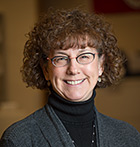Natalie Betz
Credentials: PhD in Biochemistry and Molecular Biology
Position title: Academic Director
M.S. in Biotechnology Program (in-person)
Capstone Certificate in Quality Assurance & Regulatory Affairs (online)
School of Medicine and Public Health
University of Wisconsin - Madison
Email: nabetz@wisc.edu
Phone: Program Office: (608) 262-9753

Natalie Betz received her Ph.D. in Biochemistry and Molecular Biology from the University of Nebraska Medical Center and Eppley Institute for Research in Cancer and Allied Diseases where she studied the role of the Ha-ras oncogene in skin tumorigenesis.
After receiving her degree, she worked for 3 years as a post-doctoral fellow in the Division of Biology at Kansas State University where she investigated the mode of action of a novel cell-surface growth inhibitor. She then worked as a post-doctoral fellow at McArdle Laboratory for Cancer Research at the University of Wisconsin – Madison where she investigated the role of mRNA stability in regulation of the c-myc oncogene.
She joined Promega in 1997 as a Technical Service Scientist, providing technical support and training for all of Promega’s products. She then became a Senior Applications Scientist, where her responsibilities included developing new applications for existing Promega products, assessing new technologies, validating new Promega products, and providing at-the-bench technical support and training. She also became involved in teaching several laboratory courses for the BTC Institute, the non-profit education outreach arm of Promega.
Natalie joined the M.S. in Biotechnology program full-time in 2006, where she now serves as the Academic Director of the program. She continues to design, coordinate, and instruct the Molecular Technologies series of laboratory courses that focus on developing molecular and cellular analysis skills, designing and manufacturing biotechnology products for the marketplace, and effective written and oral scientific communication.
She also serves as a co-coordinator and mentor to the students in their final semester research project course, as well as evaluating final group projects in many of the courses throughout the program. She manages overall program curriculum development and integration, faculty involvement, and student engagement.